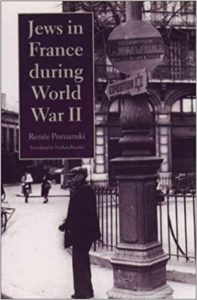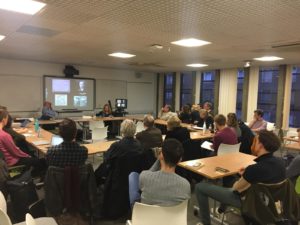
Date and Place: Monday 21st October 2019 in the IOE, Bedford Way, Room 728
Speaker:Prof Renée Poznanski (Department of Politics and Government at Ben Gurion University of the Negev)
Paper Title: Jewish, French and/or Transnational? Jews in the fight against Occupation in WWII France
Chair: Prof Julian Jackson.
Freshly arrived from Oxford where she was spending a few weeks on a visiting fellowship, Prof Poznanski offered a paper about the role of Jews in the Resistance. By taking this approach (rather than employing the phrase ‘Jewish resistance’), she was able to highlight the multiple identities of the many Jews who fought in and outside France as Jews, communists, Frenchmen and women. From well-known members of Free France such as René Cassin, to some of the founders of the Musée de l’Homme network, to Jean-Pierre Lévy who created and ran Franc–Tireur as well as a group of Jewish women in the communist resistance, Jews played significant parts and even central roles in the majority of resistance subgroups during the war. However, the presence of Jews in the Resistance remained discreet, to the point that some such as Raymond Aron would be accused of having said too little about their Jewishness during the war. To that, Aron retorted that there was a tacit convention of silence that prevailed among the Jewish Free French in London.

The key argument of Prof Poznanski’s paper was that the Jews who resisted within the French Resistance had transnational identities. Their commitment to the Resistance was variously attributable to French patriotism and political beliefs but it also had a Jewish dimension to it. Often, Jews who resisted were active members of international networks such as the American Jewish Distribution committee or the Socialist Jewish Bund. Still, Poznanski contends that these Jews often experienced such transnational encounters as temporary and minor: on the whole patriotism prevailed.
The transnational identity of Jews who resisted echoes the demographics of the Jewish population living in France at the outbreak of the war. Many Jews in France were not French: these recently exiled foreigners brought along a different political culture. Their Jewish identity had been built up in contact with other minorities and they relied on international organisations. To Poznanski, this was crucial in the creation of a Jewish transnational milieu. In addition, they were often more aware than French people of eastern and central European politics. Their knowledge of and sensitivity to Nazi violence along with solid transnational networks accounted for the organisation of rescue networks such as the Organization for Children’s Rescue. However, it would not be until the 1970s that Jews’ central role to the Resistance would start becoming publicly discussed in France.
The question of Jews in modern French history is central to Renée Poznanski’s work. Her books The Jews in France during the World War II, and Propagandes et persécutions. La Résistance et le «problème juif» have received many awards and we look forward to seeing how her new project on transnational identity develops.


